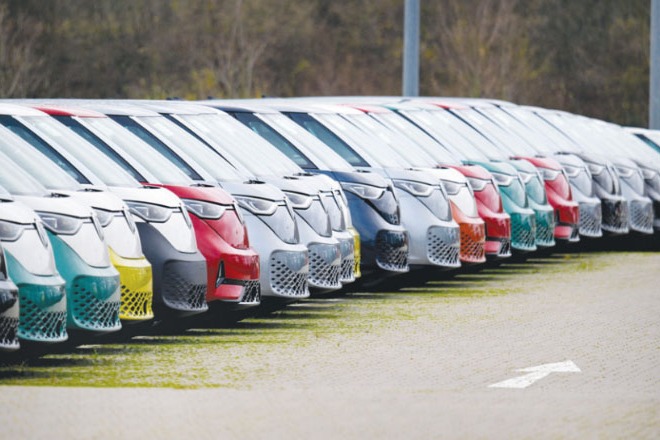Blunder in the making
EU's unwarranted action targeting Chinese EVs is a protectionist move that jeopardizes emissions reduction efforts


EU's unwarranted action targeting Chinese EVs is a protectionist move that jeopardizes emissions reduction efforts
The European Commission's recent decision to launch an anti-subsidy investigation into imports of electric vehicles from China is profoundly misguided. Far from protecting the European Union's economic interests, the probe threatens to undermine its credibility as a champion of free trade, weaken ties with one of its largest trading partners, and jeopardize climate goals.
The motivation behind the EU's move is clear. Chinese EV makers have made dramatic inroads into the European market. The share of Chinese cars in the total European car market has risen from 0.1 percent in 2019 to 2.8 percent in the first seven months of 2023, and their market share seems poised to rise further. EU automakers, still recovering from the pandemic demand shock, are understandably anxious. But succumbing to protectionist impulses now would be a strategic blunder.
First, the investigation violates the EU's long-standing support for free trade and open markets. As the world's largest single market, the EU has historically led the charge against unjustified protectionism. Launching a trade probe specifically targeting a country's exports without sufficient evidence of unfair practices sets a concerning precedent that undermines the EU's credibility as a champion of openness.
Thus far, the commission has provided no concrete proof of anti-competitive behavior by Chinese EV makers operating in the EU. Rather, it seems to be reacting reflexively to China's expanded EV exports without fully justifying the need for intervention. Until compelling evidence of misconduct emerges, this probe gives the impression of protectionism for protectionism's sake.
Second, the probe threatens to harm European consumers by limiting choice and raising EV prices. The EU plans to ban the sale of new combustion engine cars from 2035. Chinese EV makers have expanded the options for EU buyers, introducing more affordable models at a time when the transition to electric mobility remains inhibitive for many households. With price the biggest barrier to EV adoption, policies limiting Chinese imports will slow the transition from gas-guzzlers. Consumers deserve access to the widest range of products at the most competitive prices, regardless of origin.
Third, the legal basis for the anti-subsidy investigation is questionable at best. Brussels argues that Chinese EV firms benefit from unfair state support. But government incentives for EVs are the norm globally, not unique to China. Most EU member states offer generous EV subsidies. In China's case, these subsidies were aimed at spurring domestic purchases. In fact, China is not subsidizing cars exported to the EU. Singling out one country's support measures while ignoring identical policies at home smacks of protectionism masquerading as fair competition.
Fourth, in targeting China's auto exports, the EU seems to forget its own robust trade surplus in vehicles. For years, European automakers have enjoyed massive sales in China, with German brands in particular benefiting handsomely. Volkswagen sold over 3 million cars in China in 2019 alone, while BMW, Audi, Mercedes-Benz and Volkswagen altogether sold 5.27 million vehicles that year. Although the market share of Chinese EVs is rising in Europe, the best estimates suggest they may reach 2 million vehicles by 2030.
Fifth, the investigation jeopardizes shared climate goals. Transport emissions are rising worldwide, making rapid EV adoption critical for meeting the Paris Agreement targets. Policies limiting market access for EVs, the ultimate green vehicle, would slow progress on decarbonization. With the EU and China both committed to ambitious emissions reduction pledges, they should collaborate to accelerate EV uptake rather than resorting to zero-sum competition.
The EU's anti-subsidy investigation into China's EVs exports sparks deja vu. In 2013, the EU pursued an anti-dumping probe into Chinese solar panels, sparking tensions. However, both sides ultimately reached an amicable settlement, demonstrating that even amid trade frictions, win-win cooperation is attainable. As the EU and China face off again on trade, they would do well to heed the lessons from the past.
First and foremost is the importance of sustained engagement and communication. Keeping dialogue open and frequent can build understanding and prevent misconceptions. Both sides need to be forthcoming, to establish trust and facilitate compromises. Providing access to detailed findings and data will enable constructive negotiations.
Additionally, seeking mutually beneficial agreements should be prioritized over punitive measures. Win-win solutions for EVs should also be explored. For example, China and the EU could negotiate a trade agreement establishing rules and standards on subsidies, and minimum pricing, etc. The key is to craft a solution that addresses the EU's concerns while allowing Chinese EV makers' fair access to the EU market. This would be a win for both sides.
Maintaining a balanced outlook on broader EU-China trade relations is essential as well. Both sides should avoid letting the EV probe undermine their long-term trade partnership. Moreover, it is crucial to consider industry voices and involve relevant industry stakeholders in the discussions. Their insights can provide practical perspectives on the impact of any potential measures.
Most importantly, shared climate goals should provide impetus for collaboration, not conflict. EVs are crucial for meeting the emissions reduction targets under the Paris Agreement that both the EU and China have committed to. Tensions over EV exports must not distract from the bigger picture. Victory over climate change requires the EU and China to be teammates, not opponents. Our future hinges on visionary cooperation.
The author is an associate professor of the School of Public Policy at Hunan University. The author contributed this article to China Watch, a think tank powered by China Daily. The views do not necessarily reflect those of China Daily.
Contact the editor at editor@chinawatch.cn.
































